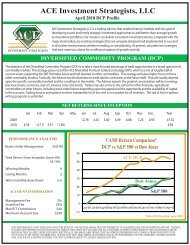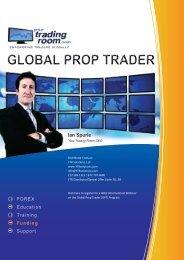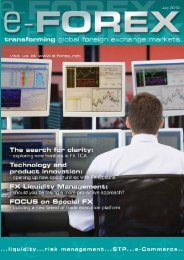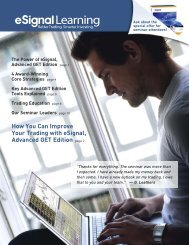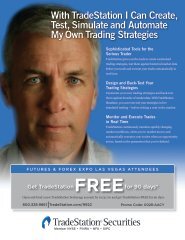You also want an ePaper? Increase the reach of your titles
YUMPU automatically turns print PDFs into web optimized ePapers that Google loves.
FOCUS<br />
Benefits of DMA<br />
Most of the providers of DMA services are in<br />
agreement when it <strong>com</strong>es to describing the benefits<br />
of DMA. According to Michael Markarian, president<br />
of Divisa Capital, a New Zealand based investment<br />
house and Currenex partner that offers Spot FX and<br />
Metal trading services, there are four clear benefits to<br />
DMA in FX – transparency, efficient execution,<br />
standardised pricing and anonymous trading. “The<br />
issue of transparency is resolved as the DMA broker<br />
is acting purely in an agency capacity. DMA orders<br />
are based on two variables – the price and the time<br />
the order is placed so the result is a far more efficient<br />
execution. DMA pricing is based on institutional<br />
standards of 1/10 of a PIP. And anonymity provides<br />
traders with a level playing field.”<br />
John Miesner<br />
“The advantage of DMA in FX is that enables clients to<br />
aggressively buy and sell but also passively bid and offer,”<br />
“The advantage of DMA in FX is that it enables<br />
clients to aggressively buy and sell in addition to<br />
passively bidding and offering,” adds John Miesner,<br />
Head of Global Sales for Knight’s Hotspot FX<br />
platform. “They are not being subjected to a specific<br />
spread by one provider – it is about accessibility to a<br />
pool of liquidity.” In addition to the aforementioned<br />
advantages of anonymity and accessibility, Miesner<br />
also highlights the benefits of low latency execution<br />
and the provision of multiple order types such as<br />
market and limit orders. “Traditionally these have<br />
been important features for any FX trader however,<br />
the low latency demands have be<strong>com</strong>e more<br />
100 | january 2010 e-FOREX<br />
pronounced due to the influx of high frequency<br />
traders into the FX market.”<br />
Regulatory perspectives<br />
As with any new trading model, there is always the<br />
concern that changes to the regulatory environment<br />
will either render certain aspects redundant or add<br />
unhelpful <strong>com</strong>plexity to the current market structure.<br />
Will the development of DMA be threatened or even<br />
enhanced by the arrival of new legislation? In the US<br />
the NFA is looking to regulate the retail FX market<br />
for those trading FX as an asset class while in the EU<br />
many of the principles associated with MiFID may<br />
be extended to cover the FX market. But perhaps<br />
most important will be the possibility of central<br />
clearing for some FX instruments, particularly swaps,<br />
says Lowry of Currenex.<br />
“There are clearinghouses like CME and ICE saying<br />
that they will clear FX which in turn may make it<br />
possible for non-traditional DMA users such as<br />
institutional money managers to trade in the FX<br />
using anonymous or aggregated liquidity pools,” says<br />
Lowry. “On the one hand it will make clearing easier<br />
but on the other hand it will introduce the need for<br />
collateral management.”<br />
Others, like Divisa Capital’s Markarian, hope that<br />
DMA users will benefit from the efficiency execution<br />
provided by the model when it <strong>com</strong>es to measures<br />
such as capital requirements. “We would hope to see<br />
the various regulatory bodies recognize and make<br />
concessions to firms that use the DMA model with<br />
regards to their capital position. There are already<br />
some regulators that have lowered capital<br />
requirements for DMA brokers since these firms do<br />
not act as the counterparty to their clients’ trades.<br />
These regulators recognize that this eliminates<br />
counterparty trading risk and the need for the<br />
increased net capital requirements (i.e. NFA<br />
minimum net capital is $20M USD). We also see a<br />
benefit with the transparency that DMA trading<br />
brings to the industry and hope this may usher in<br />
regulation standards around the world.”<br />
In Europe the regulatory landscape has been<br />
dominated by MiFID, the EU directive which aims<br />
to harmonise Europe’s securities market and<br />
promotes best execution. If the same initiative is<br />
aimed at the FX market, says Hotspot FX’s Miesner,<br />
then the vast majority of buy-side firms – traditional<br />
asst managers as well as the hedge funds - will want<br />
to trade on a platform with multiple participants




